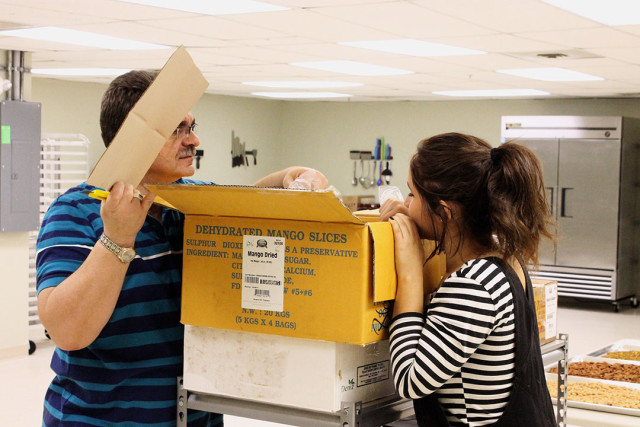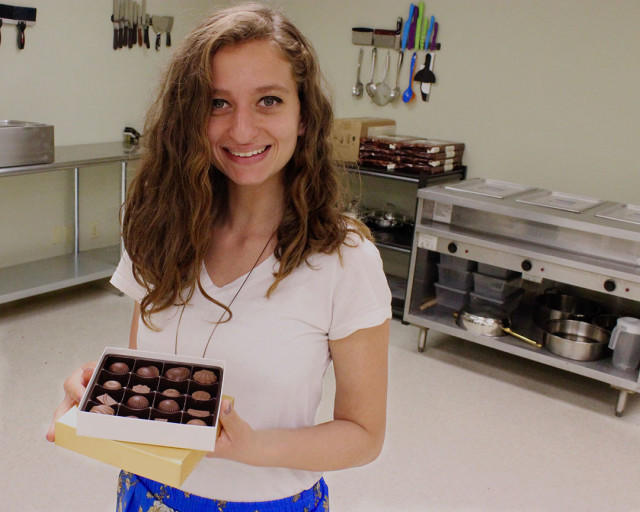Chocolate Factory in Texas Is Syrian Family’s Escape Route from War
By Cate Malek
Reporting Texas

Bashar Ghraowi and his niece Citrine Ghraowi open a shipment of dried fruit at their chocolate factory in Portland, Texas. They plan to open for business on April 9. Cate Malek/Reporting Texas
When they lived in Damascus, the Ghraowi family’s life was built around chocolate.
Every morning, Bashar Ghraowi would walk from his second-floor apartment to his family’s downstairs chocolate factory and turn on the processing machine he had built by hand. From 8 a.m. to 4 p.m., it turned Bashar’s signature mix of cocoa powder, sugar and milk into fine chocolates, which he and his two employees wrapped, packaged and sold in the store out front. The grating sounds of that machine and the lingering smell of chocolate throughout their home were so much a part of the Ghraowis’ lives that they barely noticed them until they left.
“Oh, it makes my heart hurt,” Bashar’s 23-year-old daughter, Nour Ghraowi, said as she shuffled through photos of the building where she grew up while sitting in her family’s home in Portland, Texas.
Last November, Bashar, 55, relocated his family to the town seven miles northeast of Corpus Christi where he will open a new branch of his chocolate factory on April 9. Because of a delay in receiving his visa paperwork, he has had only six months to prove the business is viable — a condition of the visa — instead of the normal year. If he can’t make the case for his new business by April 27, the Ghraowis will go back to Damascus and the devastation of the Syrian war.
More than 4 million people have fled the conflict in Syria, now in its fifth year, which is flooding Europe with refugees and giving rise to a historic crisis. The United States has largely avoided the issue, resettling only 2,000 Syrian refugees in the past five years, with about 250 of those landing in Texas, according to the U.S. Department of State. In 2015, President Obama promised to resettle 10,000 Syrian refugees by October of this year, but the United States has fallen behind on that goal.
While the Ghraowis are very much part of this story of war and dislocation, they don’t consider themselves refugees. Although they too are escaping from the brutal violence that has characterized the Syrian war, the have not applied for asylum, but are instead seeking to fulfill a long-held dream to open a factory in the U.S. market.
“It took (Bashar) 15 years to complete his factory back home,” said his sister-in-law, Sohair Sabawi. “And now we’ve done all this in five months.”
The Ghraowis have felt torn about this recent move. While they are excited about the opportunity to expand their business here, it has come at a high cost. Bashar’s 89-year-old mother Majida and 27-year-old daughter Alaa were not granted visas, and stayed behind in Damascus where Alaa now runs the main branch of the chocolate factory. The Ghraowis talk every day by Skype, but Bashar said he worries incessantly about leaving two of his family members behind.

Nour Ghraowi shows off the first batch of chocolates made in her family’s new shop. Cate Malek/Reporting Texas
In Syria, the Ghraowi name was synonymous with chocolate. In the 1930s, Ghraowi cousins started the first chocolate factories there. While some of the family went big by exporting chocolate to Europe, Nour’s grandfather Tyseer kept his shop small. Bashar, who took over the business in 1995, followed suit. Since then, he always has made everything by hand with his two employees, who worked in the shop so long they they were thought of as family.
Before the war, the family sold about 20 pounds of chocolate a day. But as fighting continued, business dwindled. Chocolate became something to buy for someone in the hospital, not just to keep around the house. Bashar explained that for the price of one kilogram of chocolate, a family could buy two kilograms of meat. Most families needed the meat.
Bashar won’t talk much about the war, saying simply that it’s “a human tragedy.”
But Nour filled in some of the details. She explained that although Damascus remained relatively safe compared to the rest of the country, the violence was never far away. Friends and neighbors, many of them young men, disappeared. Some came back in body bags. Others were never heard from again. Although the death toll from the war is disputed, the United Nations has set it at over 250,000, with other groups estimating higher numbers.
Living in Damascus, Nour walked 90 minutes to her classes at the university. She felt it was safer to walk than to drive through checkpoints, but knew she could be hit by mortar fire on the way. Bashar worried about Nour from the time she left for school until she came home. Not that home was safe either. Nour remembers waking up to gunshots outside and children laughing downstairs, a juxtaposition she got used to.
Bashar started to put plans in place to get his family out, not an easy task considering the millions of Syrians looking for a safer place to live.
“Basically, 80 percent of the people we know are refugees in Europe right now,” Bashar’s 19-year-old son Yazan said.
The countries surrounding Syria, such as Jordan and Turkey, are completely overwhelmed by the number of refugees coming in.
“It would be unimaginable for us (in the United States) to handle the proportions of a population of the almost 2 million people who are now in Turkey,” said Westy Egmont, a professor at Boston College and an expert on refugee resettlement.
So the family began to look for other ways out. His brother Ayman lives in Portland, so they began to put plans into place to open a branch of his chocolate factory there. Nour applied to the University of Texas at Austin and was accepted on her fourth try.
Bashar has had to work frantically to get the factory running before his visa expires at the end of April. The entire Ghraowi family has scrambled to secure equipment, file paperwork and market the business. Bashar said doing this work in English instead of his native Arabic often makes him feel like a child.
“He owned his own business for a long, long time,” his sister-in-law Sohair said. “So he was the boss. Here, he has to wait for us, for the city, for the county.”
Although the Ghraowis say that most Texans have given them a warm welcome, there has been controversy over whether Syrians should be allowed to resettle in Texas. Gov. Greg Abbott said last November that accepting refugees was “irresponsible.” Still, local organizations have fought to settle a few Syrian refugees around the state. Bashar shrugged off the controversy.
“It’s the story everywhere,” he said, referring to protests against accepting Syrian refugees around the world.
Bashar has more pressing things on his mind. Their new branch in Portland is tucked away in a warehouse basement on the outskirts of town. His machines are in operation, and he has produced his first batch of perfectly shaped milk chocolate seashells. In his new office, a glossy picture of his father, Tyseer, who died in 2011, rests on the bookshelf behind him — testament to the man who taught Bashar the craft that may be his family’s best chance of surviving the war in Syria.
“I know (Bashar) gets frustrated,” Sohair said. “But once he gets involved in his work he’s going to forget about it because he’ll understand … (that) chocolate … is a common language everyone can understand.”